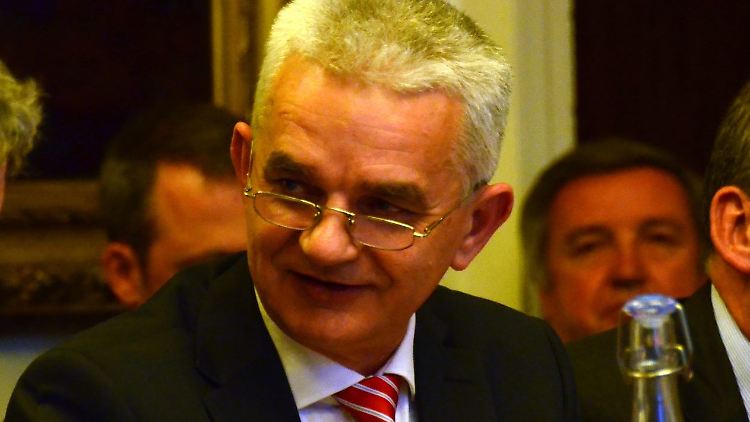The Ukrainian military expert Oleksij Melnyk currently sees Ukraine in “active defense”. For now, it’s about “keeping the damage down,” he says in an interview with ntv.de. According to his information, the expansion of defensive positions after the withdrawal from Avdiivka is not going well enough. There is a suspicion “that the construction of some positions started too late and that not all of them are in good condition.”
ntv.de: Mr. Melnyk, Ukrainian President Zelensky, who is also commander in chief of the armed forces, not only replaced army chief Saluschny a few weeks ago. Overall, a major restructuring is taking place in the leadership of the General Staff and the commanders of military branches. How do you rate all these changes?

Oleksiy Melnyk is a retired lieutenant colonel in the Ukrainian army and co-director of international security programs at the Kyiv think tank Center Razumkova. Between 2005 and 2008, Melnyk was the first advisor to the Ukrainian Ministry of Defense.
(Photo: Center Razumkova)
Oleksij Melnyk: What you have to say first with regard to Saluschnyj: It’s good that the change at least happened quite quickly after the first strong rumors began circulating at the end of January. Because the personnel decision seemed inevitable, it would have been bad for the entire chain of command if the replacement had been delayed significantly. Especially in the case of risky orders, this could have led to them not being fulfilled out of caution – because one would not have known whether the person who gave the orders would still be responsible tomorrow or the day after. Otherwise, on the one hand, one has to say that the public was not told any specific reasons for Saluzhny’s dismissal. The fact that people felt compelled to renew is not a comprehensive explanation. On the other hand, such a change is absolutely the president’s right – and it is good that it was ultimately calmly received by the population. The President took full responsibility for this and that is how it should be.
And the further restructuring at the top of the army?
It is common practice and was to be expected that the head of the general staff and other commanders, for example, are replaced along with the commander. The Army is not a civilian ministry where people are unexpectedly placed in leadership positions out of nowhere. Nobody comes out of nowhere here. The people who are now taking on responsibility are a mix of experience and younger brigadier generals with concrete frontline experience. However, all of these people are well known and enjoy a good reputation in professional circles. The idea behind the younger brigadier generals is that, given the lack of resources, they can better allocate existing resources to where they are needed – because they know the front very well. I don’t know if that works. Because without resources you can’t do a whole lot anyway.
A new military group for drones is to be created. It has not yet been formally founded, but the new commander, Olexander Syrskyj, has a deputy, Vadym Sukharevskyj, who will be responsible for drones. An exciting development?
It’s definitely an interesting and good idea that fits modern war very well. I’m generally a big supporter. Where you still have to be careful: This branch of the military must above all create opportunities for the army to use drones. This would also correspond to NATO standards. It’s about procurement, about training, about deployment strategies. However, the actual use at the front must be taken over by the existing units. We’ll see how this is implemented.
Let’s move on to the strategic and tactical situation at the front. Ukraine had to leave the city of Avdiivka in the Donetsk district and is generally on the defensive. Can we say that 2024 will be the year of active defense for Ukraine?
It has been obvious for a long time that things are developing in this direction. I wouldn’t trust myself to make a forecast for the whole year. But I can well imagine that Ukraine can wear down Russian resources and move to more local, if not larger-scale, offensive operations in three to six months. The active defense strategy envisages local attacks anyway. But for now it’s clearly about keeping the damage down.
There is much speculation in the Ukrainian media about the quality of the defensive positions built behind Avdiivka. What can you say about that?
Unfortunately, what I hear from my sources, especially from local people and their comrades, is not always positive. In fact, there is a suspicion that the construction of some positions started too late and that not all of them are in good condition. But of course I’m not there myself and we won’t be able to judge until it’s clear where the Ukrainians have consolidated themselves.
For months, Ukrainian troops have held the village of Krynky on the Russian-controlled bank of the Dnipro River in Kherson district. What is the point of this operation?
Here too, it remains very difficult to assess this. Using Krynky as a sort of staging area seems unrealistic in the foreseeable future. I rule out political reasons. What is true, however, is the fact that the Russians are losing a lot of technology and forces trying to push the Ukrainians out of Krynky, as the Ukrainian army is effectively shelling the Russians with artillery and drones from the other bank. That could be the meaning behind it. But I still can’t fully assess it.
The Ukrainians are currently reporting Russian aircraft being shot down almost every day, sometimes from great distances. Russia has lost two expensive A-50 early warning aircraft. What does that say?
The loss of two A-50s, of which Russia has fewer than ten, is serious and will make the Russian army less able to accurately fire rockets and cruise missiles at Ukraine. This is important. But it would be very relative to claim that Ukraine intercepted a lot of planes. There aren’t that many – and you have to keep in mind that shooting down an aircraft only defuses the situation on a specific section of the front for one or two days, for example when it comes to Russian glide bombing. Ukraine continues to need many more anti-aircraft systems that it can deploy near the front with some risk. What has happened so far is more in the area of isolated special operations than in the area of systematics.
You don’t believe that there are already F-16 fighter jets in Ukraine?
I haven’t seen any evidence yet that would even begin to suggest this.
What do you say about the words of French President Macron, who does not want to rule out the use of Western ground troops in Ukraine?
Well, let’s imagine that a number of states accepted Macron’s proposal. Then the specific question would be how many brigades France, which provides Ukraine with 3,000 artillery shells every month, would send to war. This question is of course rhetorical – and I don’t believe that foreign “troops on the ground” would be in Ukraine’s interest at all. Macron’s statements can also be seen as a call to do more to prevent the potential need for the deployment of troops in advance. My personal opinion is that this is not a current topic. When we talk about foreign soldiers, it can’t just be about these “troops on the ground”. The use of Western reconnaissance aircraft over the Black Sea is, in a certain way, participation in the war. And I think it would be good if people were to practice so-called air policing: they could certainly shoot down targets that are close to the western Ukrainian border solely for the purpose of their own security, but also for humanitarian reasons. Russian drones and missiles fly over the territory of Ukraine’s neighboring countries every now and then. That would be important and both sides would benefit from it.
Is Chancellor Scholz right when he says that ammunition is the most important thing the Ukrainian army needs now?
Ammunition is definitely something Ukraine lacks and desperately needs. It is the most important priority. You can’t completely replace artillery with first-person view drones, it doesn’t work that way. However, the ammunition deficit is not a reason not to deliver the Taurus cruise missile, for example. When it comes to ammunition, it is primarily about the urgent need to balance the possibilities. But in order to liberate areas, you need new qualities, one of which is the Taurus. When it comes to questions like this, Scholz is clearly taking his cues from the Americans. Overall, I would much prefer it if delivery were only announced after the first use, as the British did with Storm Shadow. The paradigm of huge political discussions on such issues is a peacetime luxury. It’s best to do something like this in secrecy.
Let’s imagine there was no US aid to Ukraine this year. What would that mean specifically?
The answer is clear: That would be the opposite of a desirable situation. As has happened a few times in this war, Ukraine will have to trade time gains for the loss of certain territories. And the Russians will be able to dig in in these territories in a similar way to how they managed to do in the south before the Ukrainian offensive. That doesn’t bode well.
Denis Trubetskoy spoke to Oleksij Melnyk
